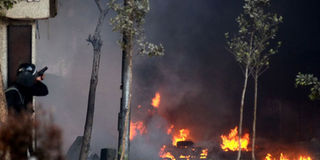Car bomb kills four at Cairo police HQ

An Egyptian policeman fires a tear gas canister during clashes with supporters of the Muslim Brotherhood in Alf Masskan district in the capital Cairo on January 17, 2014. PHOTO | AHMED GAMEL
What you need to know:
- The explosion sent a large plume of smoke billowing above the city and left a deep crater in the street
- The interior ministry said the bomb was detonated by the high metal fence surrounding the police building
A car bomb struck Cairo police headquarters on Friday, killing at least four people in an early morning blast heard across the Egyptian capital, police and health ministry officials said.
The explosion sent a large plume of smoke billowing above the city and left a deep crater in the street, an AFP correspondent reported.
The attack came a day before police were to deploy across the capital for the third anniversary of the uprising against Hosni Mubarak, with Islamists calling for mass protests against the new regime.
"It was a car bomb," interior ministry spokesman Hany Abdel Latif told AFP.
The health ministry said at least four people were killed and 51 wounded.
A witness who lives in a apartment about 200 metres away from the police building said he had been woken up by the explosion at around 6:15 am (04:15 GMT).
"My building shook," Yahya Attiya said.
The explosion left a large crater at the gate that filled with water, the blast apparently having burst an underground pipe.
It damaged the police building's facade and blew out the front door of the nearby Museum of Islamic Art.
The interior ministry said the bomb was detonated by the high metal fence surrounding the police building.
"Casualties were relatively small given the size of the blast," said Abdel Latif.
It was not immediately clear whether the attack was carried out by a suicide bomber, as in previous car bombings in Cairo and elsewhere in Egypt.
Riot police pushed back hundreds of onlookers, some of whom chanted slogans against the Muslim Brotherhood.
ESCALATED ATTACKS
Militants have escalated attacks since the military overthrew Islamist president Mohamed Morsi in July.
Morsi's Muslim Brotherhood has denied involvement in the attacks, but was blacklisted as a terrorist group after 15 people were killed when a suicide bomber blew up a vehicle at a police headquarters north of Cairo in December.
An Al-Qaeda inspired group, Ansar Beit al-Maqdis, claimed responsibility for that attack.
The Brotherhood has called for protests starting Friday to mark the January 25 anniversary of the 2011 uprising against Mubarak, accusing the military-backed government of continuing autocratic rule.
The country has been deeply divided since Morsi's overthrow, between his Islamist supporters and backers of the military which accuses the Brotherhood of terrorism.
"I can now call the Muslim Brotherhood the terrorist Brotherhood," said Attiya, as he looked at the wreckage outside the police headquarters.
"They should all be executed," he said.
Others in the crowd outside the bomb site carried Egyptian flags and some held up posters of army chief Abdel Fattah al-Sisi, the general who overthrew Morsi.
The Brotherhood has condemned previous attacks against the police and army since Morsi's overthrow.
Scores of soldiers and police have been killed in the restive Sinai Peninsula and militants in the desert region have begun to expand their operations to densely populated areas of the rest of the country.
On Thursday, masked assailants on motorbikes gunned down five policemen at a checkpoint south of Cairo.
There have also been several bombings in Cairo, including a failed assassination attempt against the interior minister in September, weeks after policemen killed hundreds of Islamist demonstrators in clashes at a protest camp.
More than 1,000 people, mostly Islamists, have been killed in street clashes since Morsi's overthrow.
Thousands more have been jailed, including ousted president and other Brotherhood leaders.





